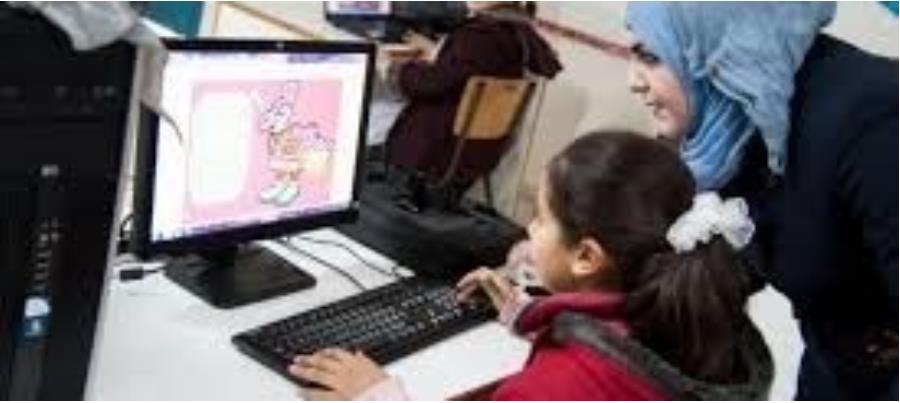The Ministry of Education (MoE) immediately launched its National Response Plan for COVID 19 where distance learning was highlighted as an alternative solution to ensure the continuation of learning to their students. The Ministry of Education is currently preparing the launch of a Facebook page “Ta2ammal” to bridge the distance gap with the students and receive feedback on their progress as well as their challenges during this outbreak. It also launched an e-learning portal to reach all grade students in Palestine.
The portal requires additional development, especially of its educational content in order to cover all grades and their associated lessons. In cooperation with Palestine TV and Al Quds Educational Channel, the Ministry also launched an online initiative to provide support to 12-grade students, who will be taking their general exam on 30 May 2020. Other initiatives for lower grades are currently being implemented at directorates’ level; including producing YouTube channel videos and using other social media platforms.
In Gaza, the Ministry has started a media campaign to encourage students to take online courses broadcasted through its media outlets, Rawafid website and Voice of Education Radio. The radio station promptly began including lessons for all grades in its broadcasts, building on the success of the previous streaming of videos for higher education courses. Against this backdrop, the Ministry called upon its education partners to support the implementation of the Response Plan. Four Task Forces were established, one of which on distance learning. The Ministry of Education and UNESCO are currently leading the Taskforce for Distance Learning. The objective of the Task Force is to establish partnerships, mobilize funds, coordinate different interventions of partners and compile online resources.
During the first meeting of the Task Force on April 1st 2020, Ms. Noha Bawazir, Head of UNESCO Ramallah Office, reaffirmed UNESCO’s commitment in supporting the MoE and joining forces with UNICEF, education cluster and other partners on the immediate response to COVID-19 crisis. This is in line with the UNESCO’s institutional commitment through the launch of the Global Education Coalition to support countries in scaling up their best distance learning practices and reaching children and youth who are most at risk. In cooperation with the ICT in Education unit at UNESCO Headquarters and UNESCO Regional Office in Beirut, UNESCO Ramallah offered to provide substantial financial and technical support to the Task Force. This includes providing content for the e-learning platform, mobile phones, TV and radio; awareness raising through social media; training teachers; and supporting the development of ICT in education strategy.
The obstacles to e-learning in Palestine mainly involve infrastructure, weak internet networks, power outage (especially in Gaza), and insufficient awareness among students and their families of the importance of e-learning. In addition, the low accessibility to online material and availability of computers or smartphones to some students, especially those in the most vulnerable areas in Palestine mainly, Gaza, East Jerusalem and Area "C".
The COVID 19 outbreak is imposing the necessity to explore even further innovative solutions to deliver education and new ways of thinking towards the future of education. The Distance Learning Task Force is laying the ground for innovative distance learning solutions to ensure inclusive and equitable quality education and promote lifelong learning opportunities for all in Palestine.


